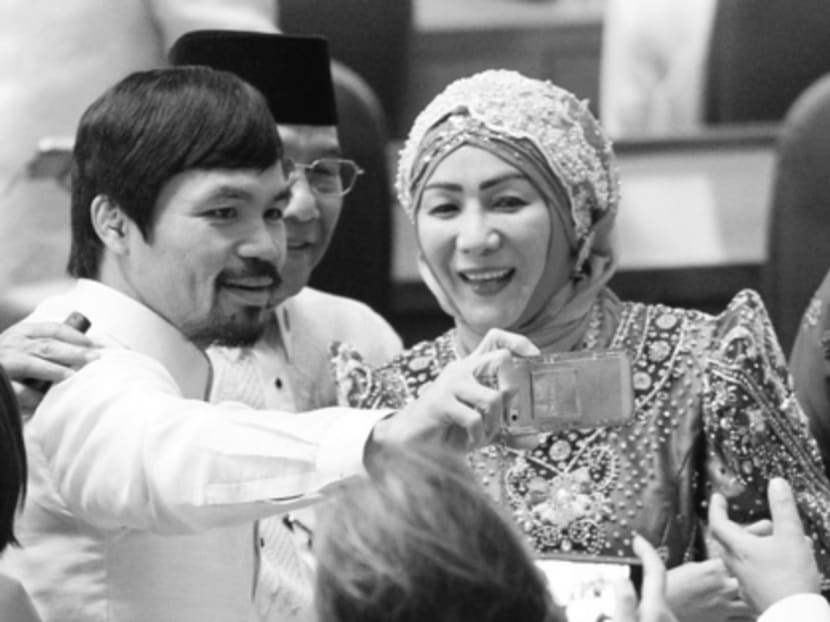Pacquiao for President? Hold that thought
Having lost the “fight of the century” to Floyd Mayweather Jr, Filipino boxer Manny “Pacman” Pacquiao now has to deal with a class-action lawsuit accusing him of hiding a shoulder injury before the match. Assuming he can despatch that case better than he did Mayweather, though, his next challenge is clear. “He’s going to be President,” promoter Bob Arum recently told TMZ Sports.

Congressman Manny Pacquiao (left) taking a selfie with fellow lawmakers at the House of Representatives last year. He plans to run for the Senate next year. Photo: Reuters
Having lost the “fight of the century” to Floyd Mayweather Jr, Filipino boxer Manny “Pacman” Pacquiao now has to deal with a class-action lawsuit accusing him of hiding a shoulder injury before the match. Assuming he can despatch that case better than he did Mayweather, though, his next challenge is clear. “He’s going to be President,” promoter Bob Arum recently told TMZ Sports.
Mr Arum, like most boxing impresarios, is admittedly not given to understatement. Still, the scenario he lays out is plausible. Pacquiao, 36, is already a two-term legislator in the Philippines. He plans to run for the Senate next year — a nationwide contest in which his unmatched popularity should serve him well. Six years later, when he will finally have passed the age threshold to become President, he will have at least a fighting chance at the nation’s highest office. In the 2013 polls, almost 40 models, actors and other celebrities (including Pacquiao and his wife, Jinkee) ran for office. In 1998, former actor Joseph Estrada actually became President.
However, that is exactly the problem. As a politician, Pacquiao fits the traditional Filipino mould a little too well. His immense wealth — according to estimates, he had career earnings of more than US$300 million (S$398 million) even before the Mayweather bout — has, on the one hand, blunted any accusations that he has profited from office. On the other hand, he seems beloved in his constituency of Sarangani, on the southern island of Mindanao, largely because of his generous patronage: He and Ms Jinkee have given supporters fishing boats, land, scholarships and even buffaloes. Pacquiao’s record as a congressman is scant; he has sponsored no successful Bills. Last year, he turned up in the legislature only four times.
Now he is reportedly scheduled to take over a congressional committee that oversees 10 million Filipinos —about 10 per cent of the population —who work overseas. No doubt Pacquiao, who grew up dirt poor and had to recycle cheap wine bottles to earn extra cash, can empathise more than most politicians with Filipinos such as Mary Jane Veloso — the former domestic worker and accused drug mule, whose last-second reprieve from execution in Indonesia riveted the nation last week. (Pacquiao issued a videotaped appeal to save her life.) Another 88 Filipinos remain on death row around the world, while countless others are vulnerable to unscrupulous traffickers, abusive employers and corrupt officials. With his sky-high global profile, Pacquiao should make a good spokesman for their plight.
CREATING JOBS FOR FILIPINOS
What Filipino migrants need even more than a champion, though, are policies that will generate good jobs at home. Although the remittances these workers send back — which reached a record-high US$24.3 billion last year — are crucial to alleviating poverty, they do little to further economic growth in the Philippines. Indeed, researchers at the International Monetary Fund said “no nation can credibly claim that remittances have funded or catalysed significant economic development”. To the contrary, a brain drain deprives the Philippines of some of its most skilled and productive workers, while the departure of one parent often leaves broken families at home. On Monday, Indonesia banned sending maids to 21 Middle Eastern countries accused of human-rights abuses and low pay, part of President Joko Widodo’s plan to end such labour exports entirely.
As Mr Widodo’s February edict suggests, it is not impossible to reverse even a massive outflow of workers. India and China, for instance, have recently seen high-skilled workers return home in large numbers. The way to make this happen is to improve infrastructure and create clusters of high-tech businesses integrated into the global system, so workers need not fear regressing in their careers if they come back.
For lower-skilled workers, increasing urbanisation and a shift towards services and higher-end manufacturing should reduce underemployment and lift wages, making up for any loss in remittances.
Pacman has had little to say about any of this — before or after his Las Vegas defeat. That is not to say he does not mean well, or that he will not always be beloved by Filipinos for his exploits in the ring.
In theory, he could surround himself with smart advisers and study up on key issues, training for higher office as he might for a championship bout.
If he does not want to do that, he might consider taking a break from politics as well as pugilism.
ABOUT THE AUTHOR:
Nisid Hajari writes editorials on Asia. Based in Singapore, he was formerly managing editor and foreign editor of Newsweek magazine, as well as managing editor of Newsweek International.






